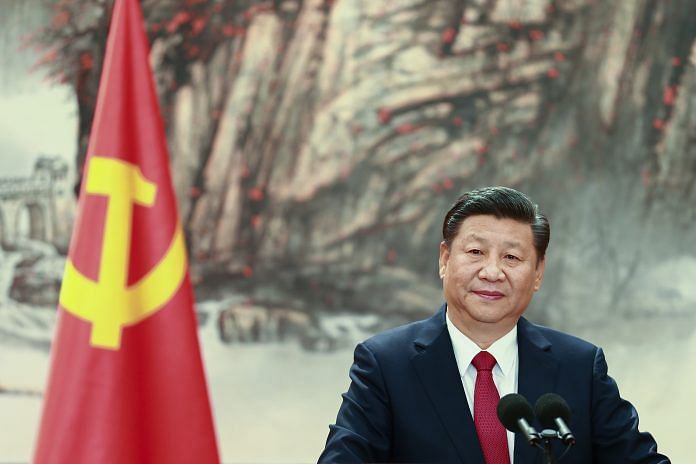Flashback to the past
The Chinese Communist Party has removed a limit on the number of presidential terms, essentially making Xi Jinping president for life. This ruthless consolidation of power is a step back into the past, an almost throwback to a time of dictators. “Forgetting the lessons of Mao’s often disastrous reign, Mr. Xi is attempting to construct a 21st-century model of totalitarianism and offer it as an example to the rest of the world,” the Washington Post editorializes.
Over the last few years, the style of collective leadership built in a truly communist spirit across the CCP has been dismantled. This style allowed a peaceful transfer of power, which his how the past three decades have gone by. Now, a “cult of personality”, or a brand, has been built around Xi.
“Under Mao and the Soviet Union’s Joseph Stalin, absolute dictatorship failed. But Mr. Xi envisions a new version driven by 21st-century technologies, such as artificial intelligence, in which his regime is investing heavily. Each citizen will be given a “social credit” score, with demerits for unapproved behavior detected by cyber-monitoring or cameras with facial recognition. Through its “Belt and Road” initiative, which foresees the investment of hundreds of billions of dollars in countries across Eurasia, the regime will build its global influence and promote its political model — which, Mr. Xi said in a speech last October, “offers a new option for other countries.””
This new policy is an unfortunate model of totalitarianism in a time that should be defined other ideals. With Russia already looking forward to another eight years (at least) with Putin, it remains to be seen if a similar situation will present itself to Xi in China.
No Castros in Cuba anymore
“For the first time in six decades, Cuba is poised to have a non-Castro as leader,” write Javier Corrales and James Loxton in the New York Times. Cuba will hold its elections on March 11, and President Raul Castro, Fidel Castro’s brother, will not run for re-election.
Back in 2012, Raul introduced term limits — which China has just done away with —and is clearly honouring them. However, what does this mean for Cuba? “One optimistic reading is that this could be the first step toward democracy. A more realistic reading is that Cuba is heading for more of the same: undemocratic one-party rule,” Corrales and Loxton write.
“If the Cuban Communist Party — the only party allowed to participate in elections under the one-party regime — were smart, it would try to get out while the getting is good. By transitioning to democracy on its own terms, the party could reap benefits.”
“Authoritarian regimes born of revolutions such as Cuba’s often survive for decades, but they struggle once the revolutionary generation dies off — especially if they cannot find an alternative source of legitimacy, such as China’s extraordinary economic growth in recent decades. For this reason, this “golden parachute” option should be appealing to Cuba’s rulers.”
But this doesn’t seem to be an option that is being considered. It looks like the status quo will continue, with a non-Castro in power, but without a major change in the state of affairs. Furthermore, Raul Castro will not step down completely, and will remain head of the Communist Party and the unofficial head of the military.
“Perhaps the only possible pressure for greater democracy after the succession could come from a conflict between the party and the military. These are separate entities, each with its own culture, resources and base of support. It is conceivable that an eventual conflict between the party and the military could produce a political earthquake, which could in theory produce a political transition.”
“Mr. Castro understands this better than anyone in Cuba. That is why he may decide to stay in charge of both groups, and as long as that is the case, the potential for a free Cuba will remain limited,” they write.
Trouble for the UK
“Almost exactly 20 years ago, after months of delicate and difficult negotiation, leaders of Northern Ireland’s two main political camps – Catholic nationalists and republicans on one side; Protestant unionists on the other – signed the Good Friday Agreement, ending more than 30 years of violence and bloodshed. Now, that agreement – and the mutually respectful and harmonious relationship that it enabled – is under threat,” writes Chris Patten in Project Syndicate.
The Good Friday Agreement essentially created a power-sharing government in Northern Island, and established a policing commission. The borders were eased, and there were no barriers or divisions between the two countries, allowing an easy flow in trade and people.
“Over the last two decades, the UK and Ireland have enjoyed the fruits of a mutually respectful and peaceful relationship,” Patten writes. “Yet serious challenges are now emerging. In Northern Ireland, the power-sharing government has broken down, and the UK government is not in a strong position to help restore constructive collaboration. In order to secure a working majority in the House of Commons after last year’s disastrous snap election, British Prime Minister Theresa May’s Conservatives made a deal with Northern Ireland’s Democratic Unionist Party, which has its roots in the more extreme unionist traditions. As a result, the UK government seems unable to act as an even-handed mediator.”
The Brexit negotiations are also throwing a spanner in the works, as the consequences for Northern Ireland and the Irish Republic remain unknown. “This leaves two possibilities: either a frictionless trade regime that operates throughout the British Isles, or a hard border across Ireland,” Patten writes.
“The reintroduction of a hard border in Ireland would be devastating, as it could undermine the Good Friday Agreement. One hopes that Irish leaders can impress this upon politicians in the UK, opening the way for a solution that doesn’t threaten Ireland’s hard-won peace and prosperity.”




Basically, India should consider Xi as “Mao in Armani”….